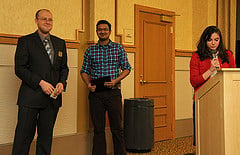
| PI Guiliang Tang (BioSci) and Co-PI Hairong Wei (SFRES) were awarded $2,499,979 from the National Science Foundation for their three-year project “Targeting microRNAs for Destruction in Crops by Short Tandem Target Mimic (STTM).”
From Dr. Joshi, Chair, Department of Biological Sciences: Heartiest congratulations to Dr. Guiliang Tang and his team on receiving a $2.5 million grant from NSF Plant Genome program for the project titled “Targeting microRNAs for destruction in crop plants by Short Tandem Target Mimic (STEM) “. This is one of the biggest grants Biological Sciences Department has received in recent years that brings our new external funding in this fiscal year close to $3.5 million. In the current era of limited funding for University research, this is a great achievement and all the credit goes to dedication of our faculty, staff and students in pursuing and publishing high quality research.” “ |
 From the
From the  Oral Presentation Award Winner: Morton Harwood from the Department of Biological Sciences was awarded the first place presentation award at the
Oral Presentation Award Winner: Morton Harwood from the Department of Biological Sciences was awarded the first place presentation award at the 